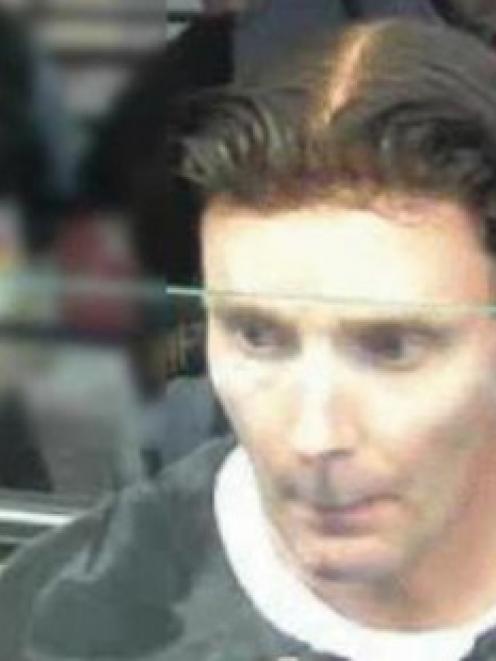
University of Auckland international law expert Bill Hodge said he believed Smith would be deported back to New Zealand, as opposed to being extradited.
Dr Hodge said Smith could be deported if his temporary visa was revoked and it was a simple process.
"We are talking about simply revoking his legal status in that jurisdiction, that is simple, common, administrative, and quick.
"That could be done tomorrow."
He said from there, officials would simply send him to the airport to deport him to a place where an airline would carry him.
Dr Hodge said Smith would likely be taken to Santiago in Chile, where he originally arrived in transit.
From there would be deported back to New Zealand.
"New Zealand is a place which will receive him because he was born here and has a right to come here."
"He'll have a police officer on his right hand and left hand to bring him back to Auckland as a person deported, not as a person extradited."
Yesterday Smith boasted that it was "highly unlikely" he would be returned to New Zealand under Brazil's laws.
Smith told Radio New Zealand he chose Brazil because he believed New Zealand would have "considerable difficulty" extraditing him back.
After his arrest, Smith appeared in court this morning in Brazil in relation to the Red Notice and the New Zealand arrest warrant.
He has been remanded in custody for 60 days.
He will be incarcerated at Ary Franco, a notorious Rio prison once condemned by the UN.
Smith has shown "no emotion" since he was taken into custody in Brazil early this morning.
Smith was arrested by Brazil Federal Police just after he was recognised by someone at a hostel in Santa Teresa, Rio de Janeiro.
Smith checked into the Cidade Maravilhosa youth hostel yesterday morning where he shared a room with three others.
At a press conference in Rio this morning Detective Superintendent Mike Pannett,
the New Zealand police liaison officer in Washington, told media gathered Smith hadn't shown any emotion since he was arrested.
Mr Pannett was the New Zealand police liaison sent to Brazil and formally identified Smith when he was taken into custody.
"I think he was surprised to see a New Zealand police officer here. Having said that, he has been very quiet since his apprehension and just considering his situation."
How the arrest unfolded
Local journalist Alexandre Tortoriello said Smith was arrested after someone at the hostel recognised him from a news report and alerted authorities.
The hostel in Santa Teresa, a hill-top neighbourhood in Rio de Janeiro's Southern Zone, is popular with tourists.
"He told everyone he was an Australian citizen, and people said he was very convincing," he said.
"[The hostel] is very afraid of him being released and coming back here, so they won't tell anyone their name.
"Until the federal police give a statement we don't know if he is just being questioned and then will be released or whether he has been arrested."
"Smith was using the name James Paul Andrews while he was at the hostel."
"It's not clear yet whether he will remain in custody or not because we don't know the legal grounds of the detention," Mr Tortoriello said.
Tortoriello told the NZ Herald Smith had slept in a six-bedroom dorm with three others.
He tried to convince one of his roommates to drive him to Sao Paulo to go sightseeing, Tortoriello said.
Coincidentally, Santa Teresa was where Ronnie Biggs, the Great Train Robber, lived much of his life in Rio.A press conference will be held by the Brazilian Federal Police later this morning.
Police notified Mr Smith's victims of his arrest early this morning.
Yesterday, new details emerged about Smith's last days in New Zealand and escape to South America.
• His half-sister Joanne Smith sponsored his release and flew from Palmerston North to pick him up from the prison last Thursday.
• Ms Smith's partner said she left Smith with another sponsor. It is suspected he took a taxi to Auckland Airport, got on a plane to Santiago, Chile, and later flew to Brazil.
• Police executed search warrants yesterday at Ms Smith's house and a laptop and other items were taken. A safe deposit box in Auckland was also searched.
• A fresh charge was laid in the Auckland District Court against Smith, for escaping from Corrections' custody.
In his first interview since the escape, the son of the man Smith murdered in 1995 told Campbell Live about his last encounter with his tormentor.
When he was 13, he woke to find Smith, who had been molesting him for three years, standing over him in his bedroom. Moments later, Smith stabbed his father to death in front of him. Smith had stalked the victim's family after they moved cities to get away from him. He went on to harass them by phone from prison.
"He has threatened us, he wanted to do the whole family. He had a hit list to kill the whole family," he told TV3's Campbell Live.
"I've had to try and rebuild my life from what he's taken from us, and it hasn't been easy. I finally feel that I'm finally getting somewhere in my life, and now he's robbing us of it again. I'm scared of him, for my family as well."
The man, who is now a father himself, said he went to bed with a knife under his bed.
"I need answers. I can't - me and my family can't - go through out lives knowing he's out there somewhere."
The victim, who has moved to Australia, said he was disappointed with Corrections, which did not contact him when Smith fled.
He said authorities had only reached out after his interview with the TV channel.
"When this dies down, are they just going to just throw a blanket over it, and we're meant to just carry on with our lives?"
Corrections boss: "We got this one wrong"
Corrections chief executive Ray Smith told the Herald the department had contacted the victim's mother about Smith's escape, because her name was down as the "nominated representative". He understood she had told the victim.
The department only became aware he wanted to be contacted directly after last night's television interview, he said.
"If he would like to meet, then I will find a way to arrange that, to follow up things. For me, it's about picking the right moment and I'd like to certainly have a good amount to talk to them [the family] about, so I can be very clear about what happened and what steps we're taking to improve the situation."
Mr Smith also apologised for how the department had handled Phillip Smith's case.
"I think we got this one wrong. I will do everything I can to fix this."
Police have since contacted Smith's victim about his disappearance.
A police spokesman said officers were looking into Smith's banking and business records.
They have also spoken to lawyer Tony Ellis, who is representing Smith, after he contacted him via a series of encrypted emails.
Detective Superintendent Mike Pannett, New Zealand police liaison officer in Washington, has travelled to Rio de Janeiro, to co-ordinate with Brazilian authorities and act as liaison with the inquiry team.
Smith spoke yesterday about his escape, saying in an email to Radio New Zealand that he fled New Zealand to "escape the vigilante justice system that operates there".
"I made a definite decision to leave the country after the outcome of my most recent parole hearing, and the advice that I received subsequent to it in terms of my prospects for parole," he wrote.
Smith had said he hoped to remain in his host country indefinitely and had no plans to ever return to New Zealand.
How easy will it be to get Smith back to NZ?
Police Minister Michael Woodhouse said New Zealand did not have a formal extradition treaty with Brazil, which prompted concerns that returning Smith to this country could be a lengthy, complex process.
But he said Smith could be liable for deportation, which would be a simpler process than extradition.
Smith was not travelling on a valid travel document and he had failed to disclose his convictions when entering Chile and Brazil, meaning he was in the latter country illegally and could possibly be deported.
University of Auckland international law expert Bill Hodge believed if Smith was caught, he could be deported from Brazil based on problems with his visa.
"Then [they would] simply send him to the airport to deport to a place where an airline will carry him, and that will be in the first instance, Santiago, Chile - where they will deport him further out of transit back to New Zealand."












